复合宾语和双宾语
宾语补足语

双宾语与复合宾语双宾语是指句中包含两个宾语,一个是直接宾语,另一个是间接宾语。
即“双宾语=直接宾语+间接宾语”,往往指人的为间接宾语,指物的为直接宾语,他们之间是非主谓关系;复合宾语是指句中包含一个宾语和一个宾语补足语,即“复合宾语=宾语+宾语补足语”,一般情况下(除过去分词作宾补外)宾语与宾补为逻辑主谓关系。
1. I bought her a new MP3 player as a birthday present.(双宾语)2. She considered the MP3 player I bought very precious.(宾语补足语)3. We all call him Wang old.(宾语补足语)宾语补足语:宾语后面加上一个词或一个短语用来对宾语的特征、状态等情况进行补充说明,使句子结构变的更加完整,这个成分我们称之为宾语补足语。
它和前面的宾语一起形成“复合宾语”它可以是名词、形容词、副词、介词短语、分词或动词不定式等。
一般包含宾语补足语的句型有两种形式,即“谓语动词+宾语+宾语补足语”和“介词+宾语+宾语补足语”。
1. 形容词作宾语补足语,常见的动词有:make, keep, get, find, wish, leave, see, consider等。
Li Ming finds it necessary to reply..Who left the window open?2. 名词作宾语补足语,常见的接宾补结构的动词有:call, name, think, make, find, consider等。
例如:They all consider her a good student.We call him Lao Li.3. 动词make, let, hear, watch, see, have, notice等使役和感官动词之后用不带to的动词不定式作宾语补足语,但这种结构变为被动语态时,不定式就必须带to。
英语中宾语语法问题精心总结《宾语》和《复合宾语》 《巧识复合宾语与双宾语》 《宾语补足语》和《主语补
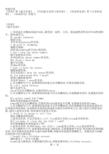
6.在完整的句子中,如果谓语动词是不及物动词,后面不可接宾语,因为句意已表达完整。
The sun rises in the morning.
太阳在早上升起。
rises是完全不及物动词,后面不可接宾语,in the morning是副词短语,作修饰语。
We are students.
我们是学生。
are是连系动词,后面不可接宾语,students是主语补语。
复合宾语
在英语中,有些动词接了一个宾语后句子意思仍不完整,还需要再加上一个词或短语放在宾语之后来补充说明其身份、特征、状态或所做的动作,这种“宾语+宾语补足语”结构称为复合宾语.
it是形式宾语,名词从句why she didn't come是真正宾语,clear是宾语补语。
5.在完整的句子中,如果谓语动词是与格动词,后面要接两个宾语,即直接宾语和间接宾语,其中直接宾语是所给与或告知的事物,间接宾语是接受事物的人。直接宾语与间接宾语时常可以互换位置。
I bought him a birthday present.
We consider him (to be) a good teacher.
我们认为他是一个好老师。
He proved that theory (to be) very important.
他证明那个理论是很重要的。
I thought her (to be) nice and honest the first time I met her.
同学们对下面两种句型常常混淆:
① 及物动词+宾语+名词宾补(即复合宾语)
② 及物动词+间接宾语+直接宾语(即双宾语)
怎样区分双宾语复合宾语

怎样区分双宾语&复合宾语■天津七中吕萍吕萍1、双宾即是指英语句子中的直接宾语和间接宾语。
有些及物动词后面可以有双宾语,一个指人,一个指物。
指人的为间接宾语,指物的为直接宾语。
间接宾语一般放在直接宾语之前,但有时为了强调直接宾语,或者间接宾语较长,就把他们的位置互换。
这时必须在间接宾语前加介词to或for,句子的含义不变。
如:Thesungivesuslightandheat.Hetoldafunnystorytohisfriend.Motherboughtanewshirtforme.大多数动词遇到上述情况,在间接宾语前加to,少数几个动词用for。
用for的常用动词有:get,buy,make,sing,draw,find等。
如:Theartistdrewahorseforthegirl.Singasongforus,please.如果直接宾语是代词,它总是放在间接宾语之前。
如:Giveittome,please.Willyoutakethesetoyourparents?2、有些及物动词除了要有宾语外还要再有一个补足语,对宾语加以补充说明,否则句子意义不完整。
宾语和它的补足语在逻辑上有主谓关系,和在一起就叫复合宾语。
那么,哪些词可以和宾语一起构成复合宾语呢?下面让我们来看一看:(1)名词(或代词)+不定式。
如:Theteachertoldustocomeearlier.Whatmakesyouthinkso?在这种复合宾语中,不定式大多带to,但在make,let,have,see,hear,watch,notice,feel,lookat,listento等动词后的复合宾语中,不定式都不带to。
(2)名词(或代词)+分词。
如:ShesawLisztsmiling.Ididn'thavemyhaircut.在这种结构的复合宾语中,现在分词表示正在进行动作的一部分;过去分词往往表示完成了。
复合宾语及双宾语区别资料
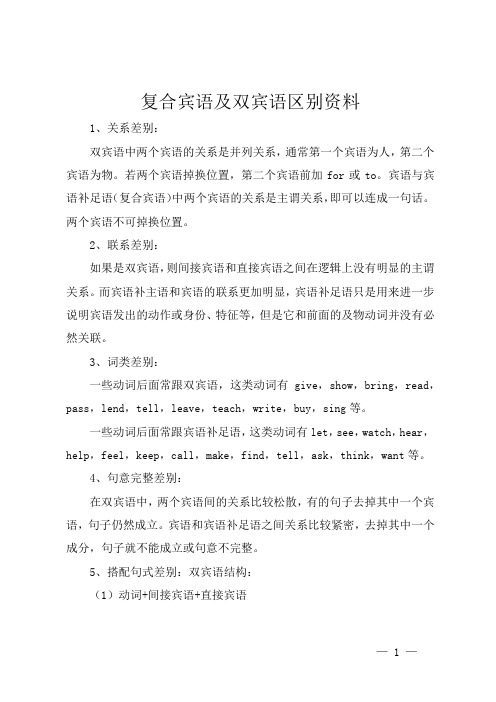
复合宾语及双宾语区别资料1、关系差别:双宾语中两个宾语的关系是并列关系,通常第一个宾语为人,第二个宾语为物。
若两个宾语掉换位置,第二个宾语前加for或to。
宾语与宾语补足语(复合宾语)中两个宾语的关系是主谓关系,即可以连成一句话。
两个宾语不可掉换位置。
2、联系差别:如果是双宾语,则间接宾语和直接宾语之间在逻辑上没有明显的主谓关系。
而宾语补主语和宾语的联系更加明显,宾语补足语只是用来进一步说明宾语发出的动作或身份、特征等,但是它和前面的及物动词并没有必然关联。
3、词类差别:一些动词后面常跟双宾语,这类动词有give,show,bring,read,pass,lend,tell,leave,teach,write,buy,sing等。
一些动词后面常跟宾语补足语,这类动词有let,see,watch,hear,help,feel,keep,call,make,find,tell,ask,think,want等。
4、句意完整差别:在双宾语中,两个宾语间的关系比较松散,有的句子去掉其中一个宾语,句子仍然成立。
宾语和宾语补足语之间关系比较紧密,去掉其中一个成分,句子就不能成立或句意不完整。
5、搭配句式差别:双宾语结构:(1)动词+间接宾语+直接宾语— 1 —(2)动词+直接宾语+for+间接宾语(3)动词+直接宾语+to+间接宾语其中间接宾语是指人的,直接宾语是指物的宾语补足语结构:(1)动词+人(宾语)+动词原形(2)动词+宾语+形容词(3)动词+宾语+带to的不定式(4)动词+宾语+省to的不定式(5)动词+宾语+名词短语— 2 —。
双宾语与复合宾语

六、含有双宾语的句子换为被动语态时,直接宾语和间接宾 语都可以做主语。如:
He ordered the meal for us. We were ordered the meal by him. The meal was ordered for us by him.
5. I forgot to send Alice a birthday card. __I_f_o_rg_o_t__to__se_n_d__a_b_i_r_th_d_a_y__c_a_rd__to__A_l_ic_e_.__
Rearrange the words below to make sentences.
1. a computer / bought / his mother / him _H__i_s _m_o_t_h_e_r_b_o_u_g_h_t_h__im__a__c_o_m_p_u_t_e_r._____
2. lend / me / one yuan / please / to __P_l_ea_s_e__le_n_d__o_n_e_y_u_a_n__to__m_e_.__________
翻译并判断下列句子的句子结构类型
1.He told us an interesting story. 2.We once called America a melting pot. 3.We thought it a good idea. 4.We made him our moitor. 5.这部电影让我想起了我的童年时光。 6.母亲问他为什么放弃了这个工作。 7.在我的家乡,新出生婴儿的父母会送亲戚朋友红色的鸡蛋。 8.我认为他是一个诚实的人。 9.这辆车花了他五十万元。 10.周末愉快!
点击英语双宾语和复合宾语
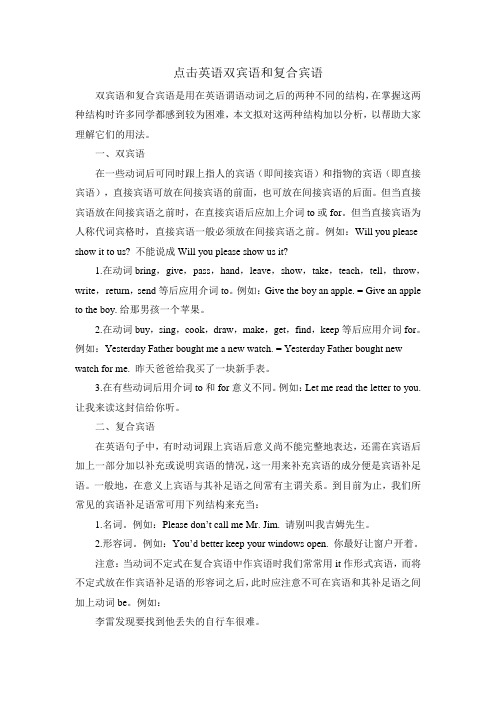
点击英语双宾语和复合宾语双宾语和复合宾语是用在英语谓语动词之后的两种不同的结构,在掌握这两种结构时许多同学都感到较为困难,本文拟对这两种结构加以分析,以帮助大家理解它们的用法。
一、双宾语在一些动词后可同时跟上指人的宾语(即间接宾语)和指物的宾语(即直接宾语),直接宾语可放在间接宾语的前面,也可放在间接宾语的后面。
但当直接宾语放在间接宾语之前时,在直接宾语后应加上介词to或for。
但当直接宾语为人称代词宾格时,直接宾语一般必须放在间接宾语之前。
例如:Will you please show it to us? 不能说成Will you please show us it?1.在动词 bring,give,pass,hand,leave,show,take,teach,tell,throw,write, return,send等后应用介词to。
例如:Give the boy an apple. = Give an apple to the boy. 给那男孩一个苹果。
2.在动词buy,sing,cook,draw,make,get,find,keep等后应用介词for。
例如:Yesterday Father bought me a new watch. = Yesterday Father bought new watch for me. 昨天爸爸给我买了一块新手表。
3.在有些动词后用介词to和for意义不同。
例如:Let me read the letter to you. 让我来读这封信给你听。
二、复合宾语在英语句子中,有时动词跟上宾语后意义尚不能完整地表达,还需在宾语后加上一部分加以补充或说明宾语的情况,这一用来补充宾语的成分便是宾语补足语。
一般地,在意义上宾语与其补足语之间常有主谓关系。
到目前为止,我们所常见的宾语补足语常可用下列结构来充当:1.名词。
例如:Please don’t call me Mr. Jim. 请别叫我吉姆先生。
双宾语和复合宾语
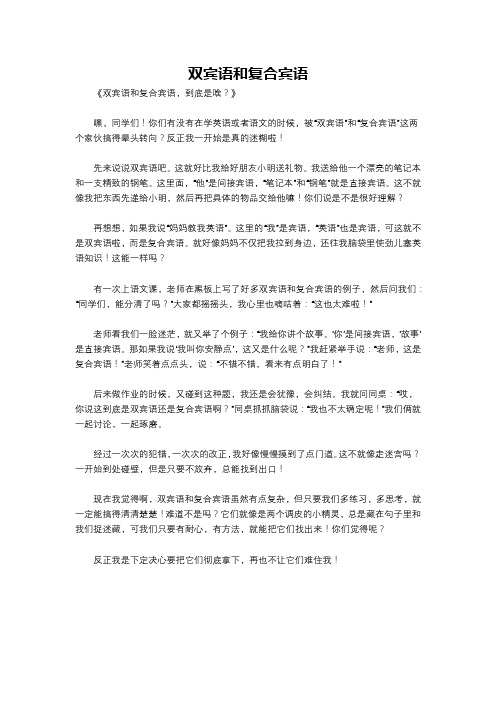
双宾语和复合宾语《双宾语和复合宾语,到底是啥?》嘿,同学们!你们有没有在学英语或者语文的时候,被“双宾语”和“复合宾语”这两个家伙搞得晕头转向?反正我一开始是真的迷糊啦!先来说说双宾语吧。
这就好比我给好朋友小明送礼物。
我送给他一个漂亮的笔记本和一支精致的钢笔。
这里面,“他”是间接宾语,“笔记本”和“钢笔”就是直接宾语。
这不就像我把东西先递给小明,然后再把具体的物品交给他嘛!你们说是不是很好理解?再想想,如果我说“妈妈教我英语”。
这里的“我”是宾语,“英语”也是宾语,可这就不是双宾语啦,而是复合宾语。
就好像妈妈不仅把我拉到身边,还往我脑袋里使劲儿塞英语知识!这能一样吗?有一次上语文课,老师在黑板上写了好多双宾语和复合宾语的例子,然后问我们:“同学们,能分清了吗?”大家都摇摇头,我心里也嘀咕着:“这也太难啦!”老师看我们一脸迷茫,就又举了个例子:“我给你讲个故事。
‘你’是间接宾语,‘故事’是直接宾语。
那如果我说‘我叫你安静点’,这又是什么呢?”我赶紧举手说:“老师,这是复合宾语!”老师笑着点点头,说:“不错不错,看来有点明白了!”后来做作业的时候,又碰到这种题,我还是会犹豫,会纠结。
我就问同桌:“哎,你说这到底是双宾语还是复合宾语啊?”同桌抓抓脑袋说:“我也不太确定呢!”我们俩就一起讨论,一起琢磨。
经过一次次的犯错,一次次的改正,我好像慢慢摸到了点门道。
这不就像走迷宫吗?一开始到处碰壁,但是只要不放弃,总能找到出口!现在我觉得啊,双宾语和复合宾语虽然有点复杂,但只要我们多练习,多思考,就一定能搞得清清楚楚!难道不是吗?它们就像是两个调皮的小精灵,总是藏在句子里和我们捉迷藏,可我们只要有耐心,有方法,就能把它们找出来!你们觉得呢?反正我是下定决心要把它们彻底拿下,再也不让它们难住我!。
高中英语句子成分和句子种类(1)

句子成分和句子种类详解句子成分和结构是英语的基础,是理解和表达英语的关键。
英语中许多词类都对句子成分和结构有影响。
英语中的句子是由词或短语组成的,这些词或短语在句子中起一定的作用,叫做句子成分。
英语的篇章是由句子构成的,不同的内容需要不同类型的句式结构,这些句式结构又构成英语中不同的句子类型。
学习英语句法的基础是了解句子成分、句子的基本结构和句子种类。
I 句子成分组成句子的各个部分叫做句子成分。
句子成分包括主语、谓语、表语、宾语、同位语、定语、状语和补足语等。
主语和谓语是句子的主体部分;表语、宾语、定语、状语、补足语和同位语等是句子的次要部分。
1.主语:主语说明谓语动作或状态的执行者,常用的作主语的词类有:名词(短语)、代词、数词、不定式(短语)、动名词(短语)和从句。
Subject is the topic or theme of the sentence, whichtells of what the sentence is about.1)名词:The students are learning grammar.Our teacher speaks very fast.2)代词:She is writing.He likes playing tennis.3)数词:Five is an odd number.Six is my favourite number.4)不定式:To learn English well is important.It is not easy to remember all rules.5)动名词:Swimming is interesting.Learning grammar well is difficult.6)主语从句:What I said is true.What we can't get seems better than what we have.2.谓语:谓语用来描述主语的行为动作或所处的状态。
英语句型 宾语区分

宾语之区分
英语句型中的宾语区分
一、直接宾语与间接宾语
1.直接宾语:通常指物,是谓语动词的直接动作对象。
例如:“I eat an apple.”
(我吃一个苹果。
) 其中,“an apple”就是直接宾语。
2.间接宾语:通常指人,并非谓语动词的直接动作对象,而是伴随谓语动词
的动作而产生的结果。
例如:“I give him a book.” (我给他一本书。
) 其中,“him”就是间接宾语。
二、单宾语与双宾语
1.单宾语:只有一个宾语的句子结构。
例如:“I saw a movie.” (我看了一部
电影。
)
2.双宾语:有两个宾语的句子结构,包括直接宾语和间接宾语。
例如:“She
teaches us English.” (她教我们英语。
)
三、复合宾语
1.复合宾语:由两个或多个部分组成的宾语,通常包括宾语和补足语两部分,
用以更完整地描述主语的动作或状态。
例如:“I consider him (to be) a friend.” (我认为他是一位朋友。
)
四、不定式宾语与动名词宾语
1.不定式宾语:由“to”引导的不定式短语作为宾语的句子结构,表示尚未
发生的动作。
例如:“I want to go shopping.” (我想去购物。
)
2.动名词宾语:由动名词作为宾语的句子结构,表示已完成或被动的动作。
例如:“I enjoy reading books.” (我喜欢读书。
)。
双宾语与复合宾语

3. the cheque / me / please / give __P_l_e_a_s_e_g_iv_e__m_e__th_e__c_h_e_q_u_e_. _________
4. Tom / to bring / him / me / asked / an umbrella _T_o_m__a_s_k_e_d_m__e_t_o_b_r_i_n_g_h_i_m__a_n__u_m_b_r_e_ll_a_._
Rewrite the sentences.
1. Please try to find me that book. _P_le_a_s_e__tr_y_t_o_f_i_n_d_t_h_a_t _b_o_o_k_f_o_r_m__e_.
2. I would like you to book us a table by the window. _I__w_o_u_l_d_l_ik_e__y_o_u_t_o_b_o_o_k__a_t_a_b_le__fo_r__u_s__ _b_y__th_e__w_i_n_d_o_w_.
Please show me your passport. =Please show your passport to me. The hospital gave the disabled boy free medical treatment. =The hospital gave free medical treatment to the disabled boy.
带双宾语,复合宾语,表语的动词

带双宾语、带复合宾语的动词以及带表语的连系动词1.带双宾语的动词:A1). give sb. sth. = give sth. to sb. (给某人某物)2).offer sb sth= offer sth to sb (向某人主动提供某物)3).hand/ pass sb sth = hand / pass sth to sb (递给某人某物)4).tell sb sth =tell sth to sb (告诉某人某事)5).write sb. sth = write sth to sb (给某人写封信)6).show sb sth = show sth. to sb (给某人看某物)7).post sb. Sth. = post sth. to sb. (给某人邮寄某物)8).promise sb. Sth. = promise sth. to sb. (答应某人某事)9).sell sb. Sth. = sell sth. to sb. (卖某物给某人)10).send sb. Sth. = send sth. to sb. (送(寄给)给他一件礼物)11).return sb. Sth. = return sth. to sb. (还给某人某物)12).teach them a song (教某人一首歌)13).read sb. letter = read a letter to sb. (给他读一封信)14).wish sb. good luck.(祝愿某人交好运)15). bring sb. sth. = bring sth. to sb.把某物给某人带来16). lend sb. sth. = lend sth. to sb.把某物借给某人17). supply sb sth.=supply sth. to sb.给某人提供某物B1).buy sb. Sth. = buy sth. for sb. (给某人买某物)2).draw sb. a picture = draw a picture for sb. (给某人画画)3).make him a cake = make a cake for him (给他们做蛋糕)4).sing him a song = sing a song for him (给他唱首歌)5).provide sb. sth.=provide sth. for sb.给某人提供某物6).build sb a house = build a house for sb (给某人建造房子)Cborrow sb. sth. = borrow sth. from sb.向某人借某物2. 带复合宾语(宾语和宾语补足语)的动词:1).call him Jack.(叫他杰克)2).name Tom Little Monkey(叫汤姆小猴子)3).make him our manager(推选他担任我们的经理)4).make our country rich and strong(使我们的国家富强起来)5).make the children stay at home (使孩子们呆在家里)6).let him do the housework 让他干家务活)7).let the boy in/ out (让那个男孩进来、出去)8).have the machine running (让机器运转)9).have them work day and night(让他们日日夜夜干活)10).keep them waiting for a long time (让他们等很长时间)11).keep the students in their classroom (使学生在教室里)12).keep the room tidy and clean(保持房间整洁)13).find the door open(发现门是开着的)14). find(see/notice /observe/ hear/ feel ) the girl helping her mother do thehousework (发现,看见,注意到,听见,感觉到那个女孩在帮她妈妈干家务活)15) . find(see/notice /observe/ hear/ feel ) his father repair the computer (发现,看见,注意到,听见,感觉到)他的父亲修好了电脑3.带表语的连系动词:1).look happy (显得, 看上去高兴)2).sound nice (听起来优美动听)3).taste terrible (吃起来,尝起来难吃)4).smell good (闻起来香)5).feel lucky(感到幸运)6).keep silent(保持安静)7).stay open(一直开着)8) .go hungry(挨饿)9).seem interesting(似乎有趣)10).The weather remains hot.(天气仍然很热)11). His dream came true.(他梦想成真)12).Our life is getting/ becoming better and better.(我们的生活变得越来越好)13). His face turned red.(他的脸变红了)14). The man grew angry. (那个人生气了)15). His father fell ill yesterday.他的父亲昨天生病了翻译下列短语:1. go bad2. send some Christmas cards to my friend3. wish my sister good luck4. draw a beautiful picture for sb.5. make the children work day and night6. call the girl Lily7. keep them staying at home8. keep the classroom tidy and clean9. look healthy and strong10. feel happy11. write my uncle an English letter12. 似乎很重要13. 吃起来香14. 看上去很生气15. 保持教师安静16.使孩子们呆在房间里17.叫汤姆小老虎18.给他们看一枚戒指19.给我朋友几本杂志单项选择题:( )1. -I am sorry to have kept you _____.-It doesn’t matter.A. waitB. waitedC. waitingD. to wait( ) you like the music the Moonlight Sonata----Yes, it ___really beautiful .A. feelsB. soundsC. listensD. hears( )2. This old man lives ___, but he never feels ___.A. alone; aloneB. lonely; aloneC. lonely; lonelyD. alone; lonely ( )5. Everyone was ___when they heard this ___ news.A. surprised; surprisedB. surprising; surprisingC. surprised; surprisingD. surprising; surprised( )3. —Is Linda good at singing—Yes, she is. We often hear her ___in her room.A. to singB. sangC. singD. sings( )4.Tomorrow's meeting is very important. Please ask them ____ there on time.A. goB. goingC. to goD. went( )5.Mike looks ____ than Paul, but they are of the same age.A. youngestB. the youngestC. youngerD. very young( )’s aunt ___a nurse.A. used to beB. was used to beC. used to be usedD. was used being ( ) wish you ___. A. a happy new year B. make a happy new yearC. will make a happy new yearD. could do a happy new year( ) often helps me ____ the housework.A. to doB. do c. with D. A, B and C冠词练习( ) ___honest boy! And he is best student of all.A.a; a B.an; the C.a; the D.the; the( )2.—Is this ___car —Yes, it’s ___English car.A.a; an B.a; a C.an; an D.an; a( ) is ___new computer. It’s on table in my bedroom.A.a; an B.a; the C.the; the D.an; the( )4.—Let’s play ___football.—That ___good.A.a; sounds B.the ; looks C./; sound D.an; sound( )5.— Max is really ___honest boy.—Yes. That’s why he is ___most popular student in his class.A.an; a B.a; the C.an; the D.the; /( )6. ___girl called Mary is my best friend and she is ___honest girl.A.A; an B.The; / C.A; / D.The; an( ) Liu is ___unusual teacher.He has written ___useful book for his students. A.an; an B.an; a C.a; a D.a; an( ) thought it was ___enjoyable tour and wanted to keep ___diary about it. A.a; an B.a; / C.an; a( )9.—Do you know ___man on TV— Yes, he is ___ honest person.Now he is planning ____ one-day trip. A.a, an B.an, the, a C.the, a, an D.the, an, a( )10、Yesterday ___ 8-year-old boy fell into the river,____boy was saved by apoliceman.A.an; A B.an; The C.a; the D.a; An( ) like playing ___piano. I also like playing ___football.A.a ,a B.the, the C.the,/ D./,the( ) is so shy that she is afraid of speaking in ____ public.A.a B./ C.the D.an( )13.—Do you know ___man on TV— Yes, he is ___honest person. Now he is planning ___ one-day trip.A.a, an, an B.an, the, a C.the, an, a D.the, a, an( ) girl in a red skirt is my friend. She has ___i-pad in her hand.A.A; an B.The; an C.A; the D.The; a( )15.–Linda, have you heard ___song Little Apple–Is it the one Chopsticks Brothers sang last yearMaybe it’s _____most popular song in 2014.A.a; the B.the; the C.a; an D.the; a( )16、There is ___“U” and ___”S” in the word “must”.A.an ; a B.a ; an C.a ; a D.an ; an( )17、Daniel is crazy about ___ DIY. ___ model plane he made looks very nice A.the, the B.a, A C.\ , A D.\ , The( )18、Usually, it’s easier to make___ decision than to take ____ action. A.a; a B./ ;an C./ ; / D.a ;/( ) father is a professor in____university in our city.A.不填 B.an C.a D.the( )20、Mr Liu is ____ unusual teacher. He has written ____ useful book for his students.A.an; an B.an; a C.a; a D.a; an( )21、—Look at ___sculpture, Jack! How do you like it—This is ___most wonderful one I have ever seen.A.the; a B.a; the C.the; the D.a; a( )22、I’m good at playing___ football, but Jenny is good at playing__ guitar(吉他).A.a; a B.a; the C.the; the D./; the( )23、English is ___ useful language and it’s also___ important subj ect. A.an, an B.a, an C.a, a D.an, a( )24. I wanted to be ___actor when I was a child. A.a B.an C.the D./( ) Li is ___ university student. He often does ___ dishes after supper at homeA.a, a B.an, the C.a, the D.the, the( ) is ___pen. ___ pen is niceA. an, The B.my, The C.a, A D.a An。
英语中宾语补足语和双宾语的区别

宾语补足语或复合宾语和双宾语在句中都由两部分组成,双宾语由直接宾语 + 间接宾语构成,直接宾语和间接宾语都是名词性质的成分;宾语补足语跟在直接宾语后面,与其构成复合宾语,有多种语法形态,那么在句中要如何区分它们呢?一、从充当成分的词性来区分1、能充当直接宾语或是间接宾语的一般是名词,名词短语或是代词,例如:A、动词 + 间接宾语 + 直接宾语I gave him some money yesterday.我昨天给了他一些钱。
I will buy her a book tomorrow.我明天给她买本书。
The teacher gave her a warning.老师给了她一个警告。
B、动词 + 直接宾语 + for + 间接宾语They baked bread for me.他们给我烤面包。
I found a pen for you.我给你找了支钢笔。
I poured a glass of water for you.我给你倒了一杯水。
C、动词 + 直接宾语 + to + 间接宾语They awarded a gold medal to top 10 schools.他们给十大名校颁发了一枚金牌。
They offered a management job to me.他们给我提供了一份管理工作。
I sent some money to you.我给你寄了一些钱。
2、能充当宾语补足语的通常有形容词及形容词短语,带 to 的不定式,不带to 的不定式,名词及名词短语,现在分词或过去分词,例如:A、动词 + 直接宾语 + 形容词(短语)We all consider her unworthy.我们都认为她不值的。
The evidence proved the accused innocent.证据证明被告无罪。
My husband and I painted our living room lime green. 我和丈夫把客厅漆成了青柠色。
双宾语与复合宾语
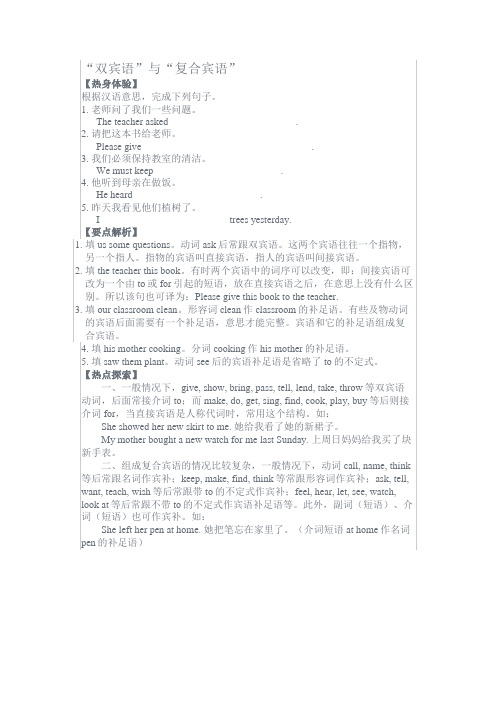
4.填his mother cooking。分词cooking作his mother的补足语。
5.填saw them plant。动词see后的宾语补足语是省略了to的不定式。
【热点探索】
一、一般情况下,give, show, bring, pass, tell, lend, take, throw等双宾语动词,后面常接介词to;而make, do, get, sing, find, cook, play, buy等后则接介词for,当直接宾语是人称代词时,常用这个结构。如:
She showed her new skirt to me.她给我看了她的新裙子。
My mother bought a new watch for me last Sunday.上周日妈妈给我买了块新手表。
二、组成复合宾语的情况比较复杂,一般情况下,动词call, name, think等后常跟名词作宾补;keep, make, find, think等常跟形容词作宾补;ask, tell, want, teach, wish等后常跟带to的不定式作宾补;feel, hear, let, see, watch, look at等后常跟不带to的不定式作宾语补足语等。此外,副词(短语)、介词(短语)也可作宾补。如:
“双宾语”与“复合宾语”
【热身体验】
根据汉语意思,完成下列句子。
1.老师问了我们一些问题。
The teacΒιβλιοθήκη er asked ________ ________ ________.
2.请把这本书给老师。
Please give ________ ________ ________ ________.
解读双宾语和复合宾语
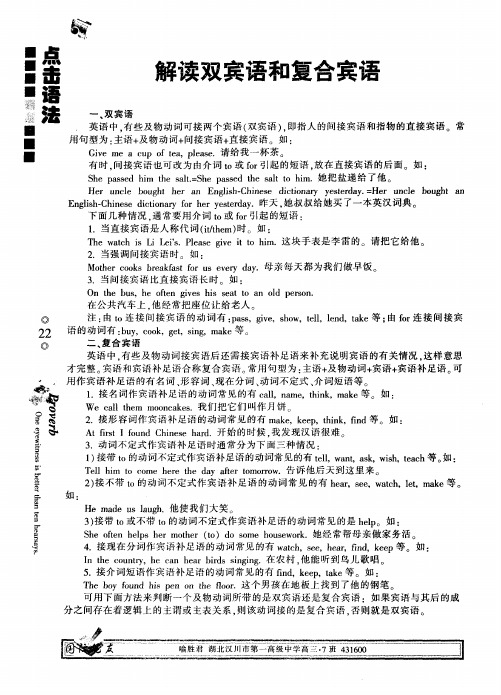
在公 共 汽车上 . 经 常把 座位 让给 老人 。 他 ◎ 注: t 由 o连接 间接 宾语 的动 词 有 :as ie h w tl ed tk p s,g ,so , el n , a e等 ; fr 接 间接 宾 v ,l 由 o连 , ) 语 的动词 有 :u ,co , e, ig a e 。 b y ok g t s ,m k 等 n 二、 复合宾 语 英语 中 . 有些 及物动 词接宾 语后还需 接 宾语 补 足语来 补充说 明宾语 的有关情 况 . 这样 意 思 才完整 。 语和宾 语补 足语合称 复合 宾语 。 宾 常用 句型为 : 主语+ 物动词+ 及 宾语+ 宾语 补足语 。 可 用 作宾语 补足 语 的有 名词 、 容词 、 形 现在 分词 、 词不定 式 、 动 介词 短语 等 。 1 名词作 宾语补 足语 的动词 常见 的有 cl a , hn , k .接 a ,nme tik mae等 。如 : l Wec l te o na e.我们把 它们 m 作月饼 。 a h m m o ck s l t 2 .接形容 词作宾 语补 足语 的动 词常见 的有 m k , ep tik f d等。如 : ae ke, h , n n i 罢 A r u d C iee h r.开始 的时候 , tf s If n hns ad it o 我发现汉 语很 难。 3 动 词不定 式作 宾语补 足语时 通常分 为下 面三种情 况 : .
Seoe ep e o e t)d o osw r.她经 常帮母亲 做家务 活 。 h f nhlshrm t r( t h o osmehue ok 4 .接现 在分 词作宾 语补足语 的动 词常见 的有 w th e,ha n,ke a ,se eL f d ep等。如 : c i I h O Rr。 ec n h a i ss g g n t cU t h a erbr i i .在农 村 , 能听到 鸟儿歌 唱 。 e y d nn 他 5 .接介词 短语作 宾语补 足语 的动词 常见 的有 f d ep tk 等 。如 : i ,k e , a e n T e b yfu d hspn o h Of h o n i e n ten 0.这个 男孩 在地板上 找到 了他 的钢笔 o 可用下 面方法来 判断一 个及 物动词所 带 的是双宾 语还是 复合宾语 :如果宾语 与其 后 的成 分 之 间存 在着 逻辑上 的主谓 或主表 关系 , 则该动词 接 的是复合 宾语 , 则就是 双宾语 。 否
双宾语和复合宾语
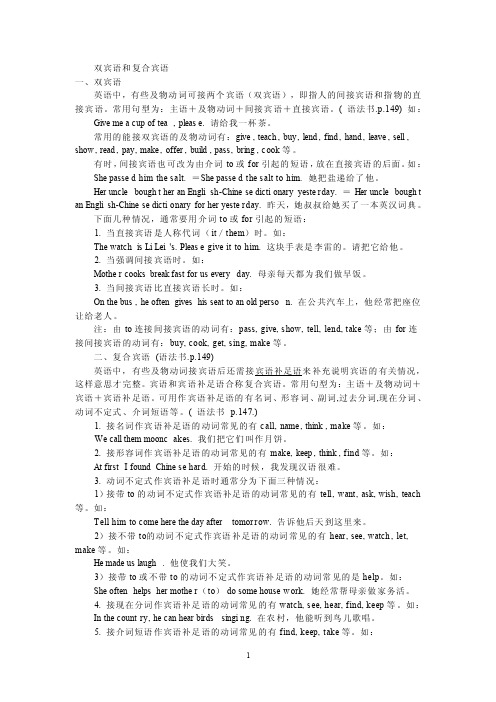
双宾语和复合宾语一、双宾语英语中,有些及物动词可接两个宾语(双宾语),即指人的间接宾语和指物的直接宾语。
常用句型为:主语+及物动词+间接宾语+直接宾语。
( 语法书.p.149) 如:Give me a cup of tea, please. 请给我一杯茶。
常用的能接双宾语的及物动词有:give, teach, buy, lend, find, hand, leave, sell, show, read, pay, make, offer, build, pass, bring, c ook等。
有时,间接宾语也可改为由介词to或fo r引起的短语,放在直接宾语的后面。
如:She passed him the salt. =She passed the salt to him. 她把盐递给了他。
Her unclebought her an Englis h-Chines e dictio naryyester day. = Her unclebought an Englis h-Chines e dictio naryfor her yester day. 昨天,她叔叔给她买了一本英汉词典。
下面几种情况,通常要用介词to或fo r引起的短语:1. 当直接宾语是人称代词(it/them)时。
如:The watchis Li Lei's. Please give it to him. 这块手表是李雷的。
请把它给他。
2. 当强调间接宾语时。
如:Mother cooksbreakf ast for us everyday. 母亲每天都为我们做早饭。
3. 当间接宾语比直接宾语长时。
如:On the bus, he oftengiveshis seat to an old person. 在公共汽车上,他经常把座位让给老人。
英语双宾语与复合宾语

英语双宾语与复合宾语英语双宾语与复合宾语(宾语补足语)的区别双宾语是指动词后有两个宾语;复合宾语是指动词后有一个宾语, 一个宾语补足语, 合起来称为复合宾语。
双宾语相对比较简单一些, 但复合宾语就复杂多了。
两者在形式上看差不多, 它们都跟在动词后面, 都是两个部分。
但它们之间在意义上、用法上还是有区别的。
下面做一个简要的分析。
1、有没有逻辑主、谓关系是根本区别(1) 双宾语, 一个是指人的间接宾语, 另一个是指物的直接宾语, 两者之间是分开的独立的两件事。
比如说:The old man told us a story yesterday.那位老人昨天给我们讲了一个故事。
这句中, us 与 a story 是分开的两件事物。
其它例子:The teacher gives each of them an eraser.老师给他们每人一块橡皮。
They teach us Chinese and we teach them English.他们教我们汉语, 我们教他们英语Please show me your new book.或 Please show your new book to me.请给我看看你的新书。
She bought me some tomatoes.或She bought some tomatoes for me.她给我买了一些西红柿。
(2) 复合宾语中, 宾语和宾语补足语之间, 在意义上有一种逻辑上的主语、谓语关系。
换句话说, 把宾语、宾语补足语合起来, 也像是一个有主、谓关系的句子。
例如:[例1]We made Tom monitor.我们选举Tom为班长。
这一句中, Tom 和 monitor 之间有主、谓关系, 即Tom is monitor.[例2]He makes us work ten hours a day.他让我们一天工作十个小时。
这一句中, us (宾语) -->work ten hours (宾语补足语) 合起来, 在意义上是说得通的, 类似于We work ten hours a day.其它例子:We will make our country more beautiful.我们要把国家变得更加美丽。
0911双宾语复合宾语
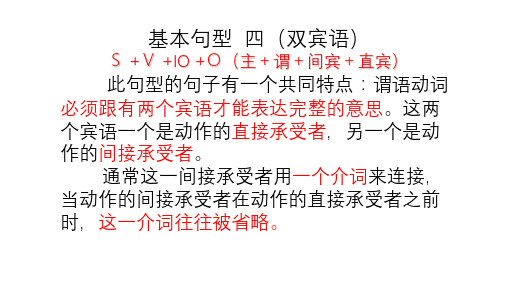
七种句子成分:主、谓、宾、表、定、状、补。
宾语补足语: 用来补充说明宾语的情况。一般
由形容词、名词、不定式、分词 和介词短语等充当。
这种句型中的“宾语+宾补”可统称为“复合宾语”。 Mr. Wang finds the story interesting.
主语
谓语
宾语
宾补
复合宾语
常用的动词如: get, feel, see, hear, have, make, let, keep, call, find, tell, ask,
S
V(及 O(宾语)
C(宾补)
物)
1. A cold 2. The worker 3. You 4. The secretary 5. What 6. We 7. He 8. Tom 9. I 10. He
kept painted can call found makes saw asked let saw makes
1.The soldiers look very happy. 2. John visited the doctor yesterday. 3.They are playing . 4. Mrs. Black helped his son brush his teeth. 5.Jenny bought a watch for him. 6.His mother gave him a new dictionary. 7.I hear her singing in the classroom. 8.The girl opened the window. 9.Catherine and Tiffany live in Zoucheng. 10.The leaves are turning green.
英语语法趣味解读高中英语八大句子成分

【英语语法】趣味解读高中英语八大句子成分无论是“理解”还是“表达”,均需建立在准确理解句子成分基础上。
若没有没有理解句子成分,就会感到一个句子杂乱无章,不知所云。
所以,学好语法,应从正确划分句子成分入手。
众所周知,句子有若干个组成部分,它们分别承担着不同的作用,组成句子的各个部分叫作句子成分。
英语中的句子成分分为主语(subject)、谓语(predicate)、宾语(object)、表语(predicative)、定语(attribute)、状语(adverbial)、补语(complement)和同位语(appositive)八种。
一、主语习惯于发号施令,偶尔也会被赶下台在句子中,主语是执行句子的行为或动作的主体。
主语一般位于句子开头,且不能省略。
但在某些特定的句式里,如:疑问句、倒装句、祈使句、感叹句等,句子主语也可以“下台”位于谓语动词之后或省略。
能够充当主语的主要有名词(短语)、代词、数词、动名词(短语)、动词不定式(短语)和从句等。
例句1. The route went from our school gate to the foot of the South Mountain. (名词作主语)2. Taking part in a fruit picking activity on a farm is meaningful and rewarding. (动名词短语作主语)3. To start with, what I intend to stress is that we are about to start our next lesson in Classroom 8 of the Teaching Building at 10 a.m. next Friday. (从句作主语)4. The competition will begin at 2 p.m. and last for roughly 3 hours. (名词作主语)5. To let China go to the world and let the world understand China is my first aim. (不定式短语作主语)6. It seems to me that the traditional Chinese dress will make the occasion very Chinese-style and inviting to the British students. (代词it充当形式主语,that引导的主语从句作真正的主语。
谈英语动词的双宾语与复合宾语结构的差异
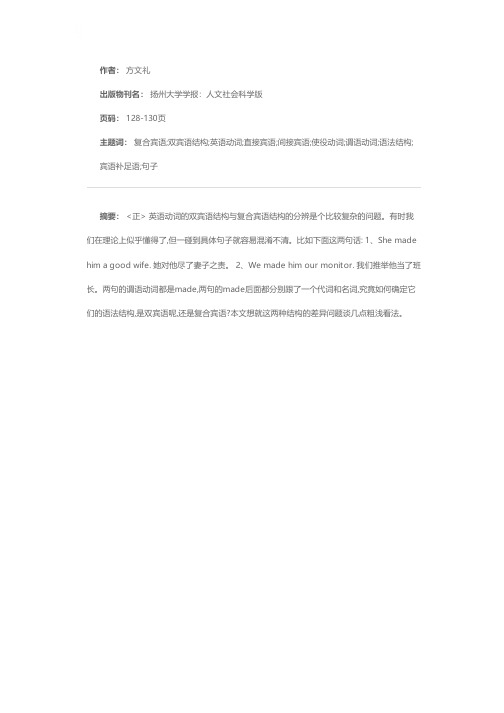
作者: 方文礼
出版物刊名: 扬州大学学报:人文社会科学版
页码: 128-130页
主题词: 复合宾语;双宾语结构;英语动词;直接宾语;间接宾语;使役动词;谓语动词;语法结构;
宾语补足语;句子
摘要: <正> 英语动词的双宾语结构与复合宾语结构的分辨是个比较复杂的问题。
有时我们在理论上似乎懂得了,但一碰到具体句子就容易混淆不清。
比如下面这两句话: 1、She made him a good wife. 她对他尽了妻子之责。
2、We made him our monitor. 我们推举他当了班长。
两句的谓语动词都是made,两句的made后面都分别跟了一个代词和名词,究竟如何确定它们的语法结构,是双宾语呢,还是复合宾语?本文想就这两种结构的差异问题谈几点粗浅看法。
- 1、下载文档前请自行甄别文档内容的完整性,平台不提供额外的编辑、内容补充、找答案等附加服务。
- 2、"仅部分预览"的文档,不可在线预览部分如存在完整性等问题,可反馈申请退款(可完整预览的文档不适用该条件!)。
- 3、如文档侵犯您的权益,请联系客服反馈,我们会尽快为您处理(人工客服工作时间:9:00-18:30)。
你这句话是复合宾语不是双宾语,判断其是双宾语还是复合宾语要看间接宾语和直接宾语有没有逻辑关系,比如你这句话的直接宾语是Jim,间接宾语是to give the class a talk,谁来give a talk,很明显是Jim,那么直接宾语Jim和间接宾语to ....直接就存在逻辑关系,所以这句话就是复合宾语。
点击一:什么是双宾语?什么是复合宾语?1、英语中,有些及物动词可以接两个宾语,即指人的间接宾语和指物的直接宾语,这两个宾语称为"双宾语"。
句子结构为:"主语+及物动词+间接宾语+直接宾语"。
如:My parents bought me a computer.我父母给我买了一台电脑。
2、英语中有些及物动词接了宾语之后还需接宾语补足语来补充说明宾语的有关情况,否则句子意思就不完整。
宾语和宾语补足语合称为"复合宾语"。
句子结构为:"主语+及物动词+宾语+宾语补足语"。
能作宾语补足语的有名词、形容词、动词-ing形式、动词不定式、介词短语等。
如:He made us laugh.他使我们哈哈大笑。
点击二:双宾语用法要点1、间接宾语可以改为由介词to或for引起的短语,放在直接宾语后面。
如:He gave her some chips. = He gave some chips to her.2、以下几种情况通常要用介词to或for引起的短语:1)当直接宾语是人称代词(it/them)时。
如:This book is Mr Wang's. Please give it to him.2)当强调间接宾语时。
如:Mother cooks meals for us every day.3)当间接宾语比直接宾语长一些时。
如:On the bus, she often gives her seat to the old person.3、由to引出间接宾语的动词有:give, show, pass, lend, take, tell等;由for引出间接宾语的动词有:buy, make, cook, get, sing, read等。
点击三:复合宾语用法要点1、常接形容词作宾语补足语的动词有:keep, make, find等。
如:We must keep our classroom clean.2、常接名词作宾语补足语的动词有:call, name, make, think等。
如:We call them mooncakes.3、常接动词-ing形式作宾语补足语的动词有:see, watch, hear, find, keep 等。
如:In the country, we can hear birds singing.4、常接介词短语作宾语补足语的动词有:keep, find, leave等。
如:I left my pen on my desk at home.5、常接带to的动词不定式作宾语补足语的动词有:ask, tell, want, teach, wish等;接不带to的动词不定式作宾语补足语的动词有:see, watch, hear, make, let等。
如:I often see him play football.She often asks me to help her.注:help后面作宾语补足语的动词不定式可以带to也可以不带to。
如:I often help my mother(to) do some housework.点击四:怎样区分"双宾语"和"复合宾语"?看宾语与其后面的成分之间的关系:如果宾语与其后成分之间存在着逻辑上的主谓关系(或主表关系),那么该动词所接的是复合宾语,否则就是双宾语。
如:Who kept you waiting so long? (宾语you与waiting之间存在着主谓关系,因此you waiting是复合宾语。
)动名词在形式上,和现在分词相同,然而现在分词具有形容词或副词的特点;而动名词具有名词的特点。
因此在句子中可用作主语、表语、宾语或介词的宾语。
例如:Working with you is a pleasure. 和你一起工作是一种乐趣。
(主语)Seeing is believing.眼见为实。
(主语)Another goal was ending the chaos in the country. 另一个目标是结束国家的混乱状态。
(表语)What he got in his mind was walking all the way to town.他心中的想的办法是一路步行进城。
(表语)My job is teaching.我的工作是教学。
(表语)To keep money that you have found is stealing.私藏拾到的钱等于偷窃。
(表语)Her shoes wants mending. 她的鞋该修理了。
(宾语)I have finished writing this book.我已经写完这本书了。
(宾语)She left without saying good-bye to us.她没有向我们告别就走了。
(介词宾语)My brother is fond of skating. 我弟弟喜欢滑冰。
(介词宾语)Thank you for giving me some help. 谢谢你给我些帮助。
(介词宾语)§10由于动名词是动词的一种形式,因此动名词也具有动词的一些特征。
动名词可以带直接宾语;可以被副词修饰。
例如:My hobby is collecting stamps. 我的爱好是集邮。
(stamps是动名词collecting的宾语)Meeting you has been a great pleasure.见到你是件很快乐的事。
(you是动名词meeting 的宾语)I like driving fast. 我喜欢开快车。
(副词fast修饰动名词driving)动名词还有几种形式:主动形式被动形式一般式being done完成式Having doneHaving been done§ 11动名词(短语)的句法功能:1.动名词具有名词的特征,做主语。
例如:Talking mends no holes. 空谈无济于事。
Sweeping the floor is my wife's everyday work.扫地是我妻子的日常工作。
Doing morning exercises is good for your health. 做早操对你的健康有好处。
【注意】注意以下句型,“it”是形式主语,动名词是正真的主语。
动名词做主语时谓语动词用单数。
例如:It is no good smoking and drinking. I suggest that you should give them up.吸烟喝酒没有好处。
我建议你应该戒掉。
It is a waste of time watching TV all day.整天看电视是浪费时间。
It is no use operating on this woman. She ought to have been sent here two hours ago. 给这个妇女做手术已经没有用了,她本来应该在两个小时之前送来。
Living together with you has been a great pleasure.和你住在一起真高兴。
My job is teaching English.我的工作是教英语。
The only thing that interests her is dancing.唯一使她感兴趣的事情是跳舞。
The real problem is getting to know the needs of the customers.真正的问题是了解消费者的需要。
To keep money you have found is stealing.捡到钱不交等于偷窃。
【注意】一般来说,动名词作表语表示主语的内容;而现在分词作表语表示主语的特征和属性。
例如:The work assigned to us is bringing the chairs downstairs.分配给我们的工作是把椅子带下楼来。
(表示主语的内容)Her job is raising pigs. 她的工作是养猪。
(表示主语的内容)The film was exciting. 这部电影激动人心。
(表示主语的特征)It is annoying that the meeting should be put off. 会议延期了使人扫兴。
(表示主语的特征)3.作宾语Andrew hated giving anaesthetics. 安德罗极不喜欢麻醉工作。
I wouldn't mind going there with her.与她一起去那儿,我没有意见。
I assure you I wouldn't have troubled you if I could have avoided doing so. 我可以向你保证,如果当时我能避免的话,我是决不会麻烦你的。
I enjoy listening to music.我喜欢听音乐。
She couldn't risk missing that train. 我不能冒险误过那次火车。
I have finished writing this novel. 我已经写完了这本小说。
【注意】1.只能用动名词作宾语,而不能用不定式作宾语的动词有:admit, abhor, acknowledge, advise, advocate, avoid, confess, consider, contemplate, defer, delay, deny, discontinue, dislike, enjoy, excuse, face, fancy, finish, grudge, can't help, imagine, include, involve, justify, keep, mind, necessitate, pardon, postpone, practise, renounce, resent, require, stand, suggest, understand, give up, leave off, put off等等。
